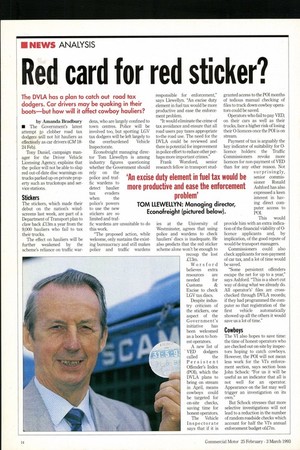Red card for red sticker?
Page 16

If you've noticed an error in this article please click here to report it so we can fix it.
The DVLA has a plan to catch out road tax dodgers. Car drivers may be quaking in their boots—but how will it affect cowboy hauliers?
by Amanda Bradbury • The Government's latest attempt tp clobber road tax dodgers will not hit hauliers as effectively as car drivers (CM 1824 Feb).
Tony Daniel, campaign manager for the Driver Vehicle Licensing Agency, explains that the police will not be able to slap red out-of-date disc warnings on trucks parked up on private property such as truckstops and service stations.
Stickers The stickers, which made their debut on the nation's windscreens last week, are part of a Department of Transport plan to claw back £13m a year from the 9,000 hauliers who fail to tax their trucks.
The effect on hauliers will be further weakened by the scheme's reliance on traffic war dens, who are largely confined to town centres. Police will be involved too, but spotting LGV tax dodgers will be left largely to the overburdened Vehicle Inspectorate.
Econofreight managing director Tom Llewellyn is among industry figures questioning whether the Government should rely on the police and traffic wardens to detect haulier tax evaders when the police's powers to use the new stickers are so limited and traffic wardens are unsuitable to do this work.
"The proposed action, while welcome, only sustains the existing bureaucracy and still makes police and traffic wardens responsible for enforcement," says Llewellyn. "An excise duty element in fuel tax would be more productive and ease the enforcement problem.
"It would eliminate the crime of tax avoidance and ensure that all road users pay taxes appropriate to,the road use. The need for the DVLA could be reviewed and there is potential for improvement in police effort to reduce other perhaps more important crimes."
Frank Worsford, senior research fellow in transport stud ies at the University of Westminster, agrees that using police and wardens to check hauliers' discs is inadequate. He also predicts that the red sticker scheme alone won't be enough to recoup the lost £13m.
Worsford believes extra resources are needed for Customs Excise to check LGV tax discs.
Despite industry criticism of the stickers, one aspect of the Government's initiative has been welcomed as a boon to honest operators.
A new list of VED dodgers called the Persistent Offender's Index (P01), which the DVLA plans to bring on stream in April, means cowboys could be targeted for on-site checks, saving time for honest operators.
The Vehicle Inspectorate says that if it is granted access to the POI months of tedious manual checking of files to track down cowboy operators could be saved.
Operators who fail to pay VED, on their cars as well as their trucks, face a higher risk of losing their 0-licences once the POI is on stream.
Payment of tax is arguably the key indicator of suitability for 0licence holders: the Traffic Commissioners revoke more licences for non-payment of VED than for any other reason. Not surprisingly, senior commissioner Ronald Ashford has also expressed a keen interest in having direct computer access to POI.
This would provide him with an extra indication of the financial viability of 0licence applicants and, by implication, of the good repute of would-be transport managers.
Commissioners could also check applicants for non-payment of car tax, and a lot of time would be saved.
"Some persistent offenders escape the net for up to a year," says Ashford. "This is a short cut way of doing what we already do. All operator's' files are crosschecked through DVLA records; if they had programmed the computer so that registration of the first vehicle automatically showed up all the others it would save us a lot of time."
Cowboys The VI also hopes to save time: the time of honest operators who are checked out on-site by inspectors hoping to catch cowboys. However, the POI will not mean less work for the VI's enforcement section, says section boss John Schock: "For us it will be useful as an indicator that all is not well for an operator. Appearance on the list may well trigger an investigation on its own."
But Schock stresses that more selective investigations will not lead to a reduction in the number of random roadside checks which account for half the VI's annual enforcement budget of£7m.












































































